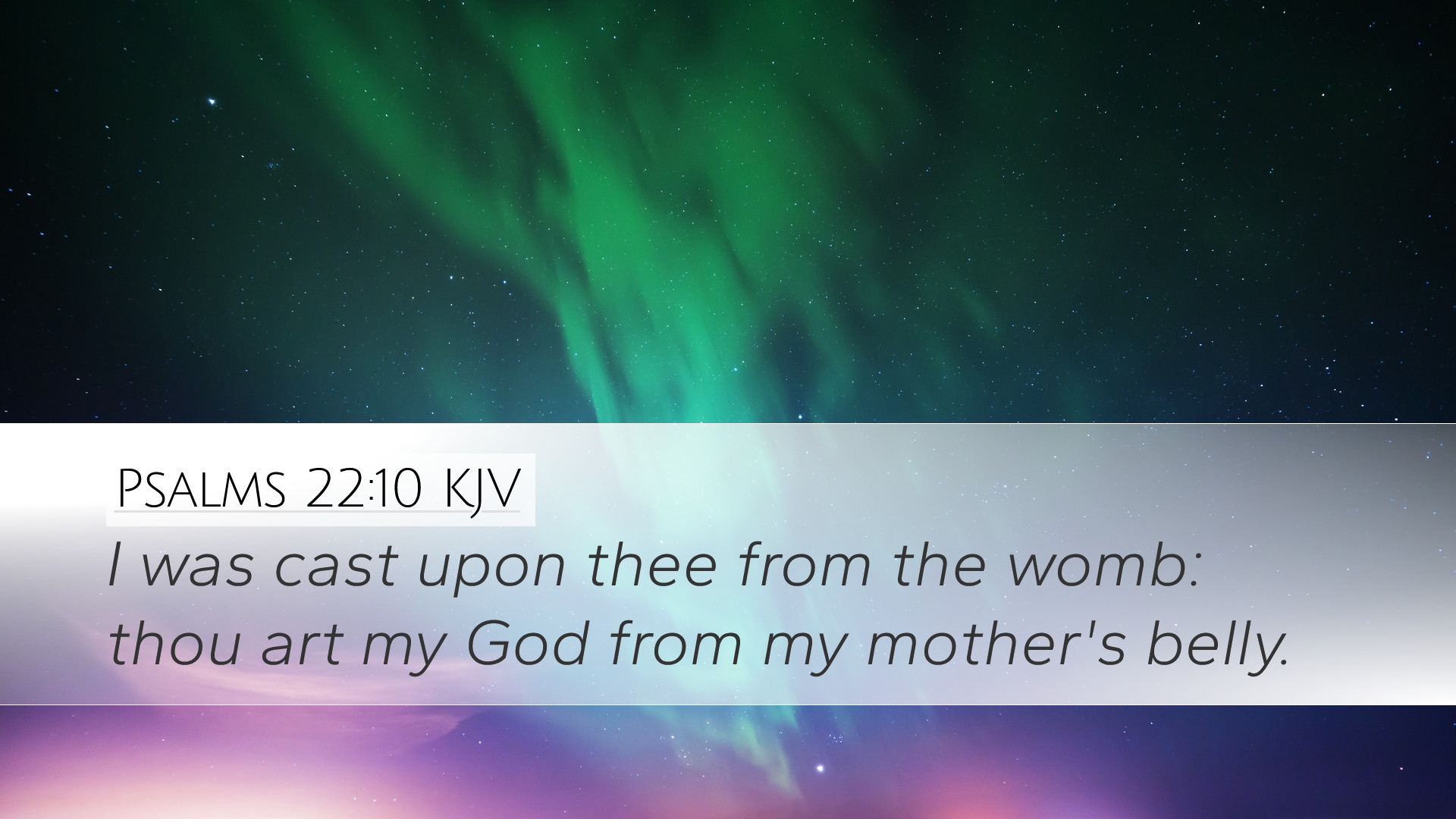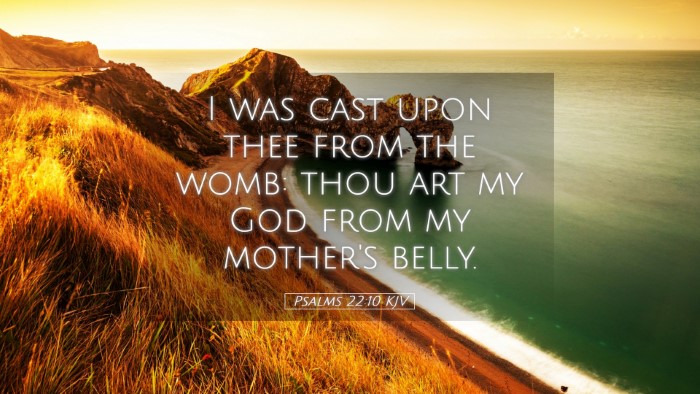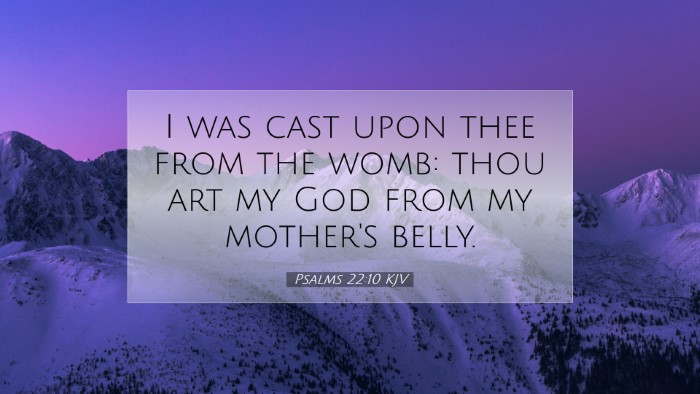Bible Commentary on Psalms 22:10
Psalms 22:10 (KJV): "I was cast upon thee from the womb: thou art my God from my mother's belly."
Introduction
This poignant verse from Psalms 22 illustrates a deep sense of reliance upon God from the very beginning of life. It captures the psalmist's understanding of divine sovereignty and personal relationship with the Creator. In this commentary, we will explore the insights provided by several public domain theologians, including Matthew Henry, Albert Barnes, and Adam Clarke.
Contextual Background
The context of Psalm 22 is crucial for understanding this verse. It is a lament psalm attributed to David, expressing despair yet confidently turning to God in hope. The psalm progresses through a profound sense of abandonment that transitions into expressions of trust. This verse stands out as a declaration of lifelong dependence on God.
Commentary Insights
Matthew Henry's Perspective
Matthew Henry focuses on the fervent trust expressed in this verse. He notes that the psalmist acknowledges God’s sovereignty from the earliest stages of existence, signifying that even in the womb, he was divinely protected and guided. Henry argues that this acknowledgment serves as a source of comfort, emphasizing that God’s presence is not limited to the conscious stages of life but encompasses the entirety of our being from the moment of conception.
Henry stresses the importance of forming a relationship with God early in life, as it sets a foundation for faith. The act of being "cast upon thee" indicates a complete reliance and submission to God, highlighting the personal nature of salvation and divine care.
Albert Barnes' Insights
Albert Barnes offers a detailed exposition of the theological implications behind the phrase "I was cast upon thee." He interprets it as a metaphor suggesting that the speaker’s existence and welfare are entirely in God's hands. Barnes emphasizes that this statement reflects a recognition of God as the origin and sustainer of life.
Moreover, Barnes points out the significant meaning of God being a personal deity who is intimately involved in the life of an individual. He notes that the psalmist expresses confidence in God’s providential care throughout the stages of his life, highlighting the relational aspects of faith which transcend mere ritualistic practices of worship.
Adam Clarke's Commentary
Adam Clarke provides a thorough exegesis of the text, drawing attention to the implications of being "cast upon" God. He interprets this as an expression of faith rooted in acknowledgment of God’s nurturing presence, even before the psalmist was aware of his own identity. Clarke stresses that the term "from my mother's belly" conveys the idea that God’s protective influence is evident throughout the psalmist's lifecycle.
Clarke also connects this verse to themes of predestination and divine purpose, suggesting that God has a plan for each individual, marked by His unwavering guidance. He discusses how this passage anticipates the concept of God’s grace that enables individuals to find comfort in their difficulties, asserting a theocratic existence intertwined with divine intervention.
Theological Reflections
The verse raises significant theological reflections concerning divine sovereignty, human dependency, and the nature of faith. Each commentary highlights the necessity of recognizing God’s role in the creation and sustenance of life:
- Divine Sovereignty: The assertion that we are "cast upon" God points to His ultimate authority over creation and human destiny.
- Human Dependency: This verse reflects the intrinsic need for reliance on God, which resonates with the existential struggles of humanity.
- Faith from Birth: The notion that faith can and should be nurtured from early life underscores the significance of upbringing and spiritual instruction.
Application for Ministry
For pastors and ministry leaders, Psalms 22:10 presents numerous applications:
- Nurturing Faith in Children: Encouraging parents to instill faith in their children from an early age, emphasizing that dependence on God should begin as early as possible.
- Comfort in Troubling Times: Reminding congregations that God has been present in their lives even before they could comprehend it, thereby providing comfort during trials.
- Emphasizing God's Fatherhood: Drawing parallels between earthly parenthood and God’s protective nature, helping believers understand their identity in Christ from birth.
Conclusion
Psalms 22:10 is a profound declaration of faith that intertwines the concepts of divine sovereignty, human dependency, and the lifelong relationship between God and the believer. The insights from Matthew Henry, Albert Barnes, and Adam Clarke collaborate to form a rich tapestry of understanding surrounding this verse. It serves as a reminder that from our very beginnings, we are cradled in the hands of a loving God who seeks to nurture, guide, and sustain us through every stage of life. For students and theologians, this passage invites deeper exploration into God’s nature and our response to His grace.


